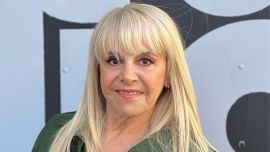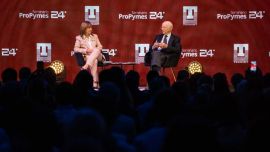Argentina’s economic turmoil, its external debt and the crisis in Venezuela took centre-stage in Santa Fe on Sunday night, as the country’s six remaining presidential candidates went face-to-face in the campaign’s first debate.
The event, held just two weeks before Argentines head to the polls for a crunch election, was the clearest opportunity for President Mauricio Macri to try and turn around his bid for re-election, which took a huge blow after the August 11 PASO primaries, in which opposition Peronist hopeful Alberto Fernández emerged victorious with a 16-point lead.
However, it was the Frente de Todos frontrunner who came across as the most critical of the candidates on Sunday night, regularly attacking his rival’s record in office.
"When [Macri’s] term ends, he will have left five million new poor people," Fernandez said, referencing recent figures posted by the INDEC national statistics bureau showing 35.4 percent of Argentines are now living in poverty.
"A place where Macri's government has failed flatly is the economy," he declared bluntly at one point.
The incumbent, meanwhile, stood up for his administration and only took on a more aggressive in the latter stages of the debate, when he sought to link Fernández to Argentina’s previous governments led by his running-mate, former president Cristina Fernández de Kirchner and her late husband and ex-head of state Néstor Kirchner.
“[I’m surprised] that Alberto Fernández says that I destroyed the economy when, until very recently, he said that president [Fernández de] Kirchner destroyed it," Macri attacked.
“Kirchnerismo doesn’t change,” the president declared in his closing statement, as he asked Argentines to grant him four more years in office.
CLAIMS
The debate, the first to be held since the passage of 2016 legislation making participation mandatory for presidential hopefuls, was divided into four parts, each with its own cluster of issues – international relations, the economy and finance, and human rights, diversity and gender and education and health.
Macri told viewers that his administration had “solved problems” that had “dragged on for decades,” asking voters to “continue working together” with his government.
"I know that in the last year the burden has been very large, especially for the middle class. [But] we are at the starting point to begin growing again," Macri said.
Fernández, in contrast, highlighted the lack of speaking time he would have in the debate. The awkward structure of the event, which saw those onstage given two minutes speaking time on a topic, followed by additional shorter rounds to pose questions and provide responses, meant there was no direct interaction between the candidates, with many having to wait before answering.
“I have only 13 minutes to tell you what I want us to do together," said Fernández, who remained calm throughout, in his opening statement.
"Four years ago, someone in a debate lied a lot and someone told the truth,” he said, referencing Macri’s debate with the 2015 election’s runner-up, Peronist Daniel Scioli.
“The one who lied is the President,” concluded Fernández.
VENEZUELA, MALVINAS
For the most part, the earliest exchanges at the Universidad Nacional del Litoral in Santa Fe were dominated by talk of the crisis in Venezuela and Argentina’s sovereignty claim over the Malvinas (Falkland) Islands.
"We have recognised [Venezuela’s self-declared interim] president Juan Guaidó,” said Macri, using his government’s position on the crisis to differentiate himself from Fernández, who has taken a less firmer line on the country led by President Nicolás Maduro.
Guaidó, the head of Venezuela’s National Assembly, proclaimed himself interim president in January, alleging Maduro’s re-election victory was “fraudulent.” More than 50 countries, including Argentina and the United States have since recognised Guaidó as Venezuela’s leader. While the Peronist hopeful has not indicated his position on the recognition either way, he has indicated he would adopt the more neutral stance taken by Uruguay and Mexico.
“Being neutral is synonymous with support for the dictatorship of Maduro," declared Macri, digging at Fernández.
"Venezuela has problems,” Fernández responded later in his own allocated time-slot. “But unlike the president I want Venezuelans to solve the problem,” he added, saying that he hoped Argentina would not become involved in potential military action on Venezuelan soil.
The Peronist challenger also remarked on the Macri administration’s role in the historic free-trade accord between the Mercosur regional trade bloc and the European Union (EU), saying he could not remark on it fully as he hadn’t seen “the small print.” He vowed, however, not to approve it as president if it damaged Argentine jobs and industry.
“Globalisation does not force us onto our knees,” he added in his section. “The first obligation we have is to bring Latin America back together through the Mercosur [trade bloc].”
Pivoting onto the Malvinas (Falkland) Islands – which was heavily referenced by some of the other candidates onstage, the Frente de Todos hopeful accused the Macri administration of “forgetting” about the disputed islands. “I have not,” he added.
He then, referencing Macri’s own highlighting of Argentina’s G20 presidency and hosting of the organisation's Leaders Summit, said scathingly that “international relations is not taking pictures with leaders.”
ECONOMY, DEBT
The debate’s section dedicated to the economy sparked the most notable exchanges between the two frontrunners, with Fernández taking on Macri over the impact of the government’s agreement with the International Monetary Fund (IMF).
The Frente de Todos hopeful criticised both the loan and the deployment of the US$39 billion received thus far from the Fund, saying most of it had fled the country and alleging that much of it was now in the hands of the president’s “friends.”
Outraged, the president countered by linking Frente de Todos and its candidate to alleged Kirchnerite corruption.
"I am glad and surprised that Frente de Todos speaks of corruption,” he said after one exchange, adding that he would have more to say when the topic is debated at the next event at the University of Buenos Aires next Sunday.
Macri was also criticised for the rise in Argentina’s debt. Recent data from INDEC revealed that total external debt stood at US$283.567 billion at the end of the second quarter of 2019. The president responded by saying that "two out of every three pesos” were used to “pay debt from the previous government."
In the second half of the debate, Macri took on a more aggressive approach, seeking to link the Frente de Todos frontrunner repeatedly to former Kirchnerite administrations and saying Argentina should not look backwards.
The spiciest exchange of the second half of the debate perhaps came during the education and healthcare section.
President Macri ironically claimed that Axel Kicillof – the former economy minister and favourite to win the gubernatorial race in Buenos Aires Province – was “going to put a narco-training course in schools,” a reference to recent remarks by the Frente de Todos candidate that those out of work in Argentina’s shantytowns were resorting to moving drugs in order to survive.
Fernández, angered by the remark, responded in his own time that “I thought we were going to be serious, but unfortunately he [Macri] is still lying,” claiming that the education budget under his administration fell by 40 percent."
OTHER CANDIDATES
As the debate got underway, the other four candidates – Roberto Lavagna (Consenso Federal), Nicolás Del Caño (Frente de Izquierda), José Luis Espert (Unite) and Juan José Gómez Centurión (Nos) – quickly drew the eye with their rhetoric.
While all passed the 1.5-percent PASO threshold needed to qualify for the October 27 election, none of the four are given a real chance of wining the race by pundits. Nonetheless, they were given equal speaking time under the terms of the legislation enshrining the rules of the debate.
Lavagna, who took around eight percent in the PASOs, is the only candidate seen as having a real chance of impacting on the October 27 ballot. He was keen to present an ordered approach, detailing his economic ideas as much as the time allowed and calling for consensus.
Describing the economy as "paralysed," he went on to describe the Macri administration's foreign policy as "erratic." He said Argentina's natural and human resources were "exceptional" and said productivity should once again be put at the centre of Argentina's growth model. He decried the level of hunger in Argentina, especially those aged under 17, describing that state of affairs as a "violation of human rights."
“We have the obligation to show there is a better future,” said Lavagna in his closing remarks, adding it was the responsibility of the entire political class to take Argentina forward.
Gómez Centurión, arguably the more extreme of the candidates on the stage, was noticeable in one particular aspect – his inability to keep to time limits. He was regularly cut off by the debate’s moderators when his allocated time limit ran down. In an interview post-debate on TN, he laughed off the problem, explaining it was his first experience of such an event.
The Frente Nos candidate argued onstage that Argentina “must reduce fiscal and public spending” and “lower taxes,” as well as calling for compensation for the “victims of subversion.”
However, he made the most impact – as he has in the campaign – with his clear stance against abortion reform, making waves online with his controversial claim that those in favour of the procedure were giving Argentine women “misoprostol [medication that can cause an abortion] as candies.”
Meanwhile, Del Caño, the candidate with the clearest left-wing credentials, drew attention for his willingness to attack both Macri and Fernández – as well as a couple of carefully prepared stunts.
First off, the FIT candidate asked for a minute’s silence for those who had died in the recent turmoil in Ecuador. When that didn’t materialise, he decided to enforce the silence himself, using 15 of an allocated 30 seconds speaking time to remain silent, staring down the camera lens.
Later on, in a section addressing human rights, Del Caño emphasised that his party are pro-women’s rights and all candidates for the front he leads are in favour of abortion reform, emphasisng the point by holding up his wrist with a green handkerchief.
In his closing remarks, he aimed his remarks at the youngest members of Argentina’s society, asking them to back his candidacy in two weeks time and highlighting the “brutal inequality” between the rich and the poor.
Espert played the outsider card once again in his opening speech, pointing out that the rest of the candidates had experience in politics and suggesting they were part of the problem. He described himself as a "common citizen, like you."
He described the Maduro administration as a "dictatorship" and said Argentina must look out to the "whole world." Criticising informal employment, he called for change and a State of "reasonable taxes and "lower labour costs," criticising veteran union leader Hugo Moyano.
He also criticised Argentina's unions in the exchanges on education.
TWO WEEKS
Both the favourites in the race, Macri and Fernández, left the university’s premises immediately after the event. The other four candidates remained in Santa Fe, with most giving interviews to national television stations.
Campaigning will step up this week as the vote draws closer, with the president set to continue his ‘#SiSePuede’ tour, which sees him planning to hold 30 rallies across the country in 30 days.
In the PASO primaries, Fernández obtained 47.78 percent of the vote and Macri 31.79 percent, according to Argentina’s electoral authorities.
If the Frente de Todos hopeful wins 45 percent of the vote on October 27, he will win outright in the first round. The same would happen if he takes 40 percent of the vote and leads Macri, or the second-highest ranking candidate, by more than 10 points.
Failing that, the two top-placed candidates will face-off in a second round on November 24, with a third head-to-head debate pencilled in for one week before the run-off.
If none of these results is met, the eventual second round will take place on November 24 with a third debate on the 17th of that month.
The most recent polls, which in general were way out in terms of predicting the results of the PASOs, predict that Fernández’s lead over Macri has not stretched to 20 points.
One surprise guest in Santa Fe was former presidential candidate and Peronist stalwart Daniel Scioli.
Scioli, who lost the presidential race to Mauricio Macri in the run-off vote in 2015, lunched with Fernández prior to the main event and took a seat in the first few rows in Santa Fe.
Reports in the immediate aftermath of the debate indicated that the Macri administration were happy with the president's performance, with national officials briefing that he had stuck to the script drawn up by his team in recent weeks, which was not to go on the attack unless provoked, with the hope that Fernández would lose votes as he detailed his proposals.
Macri, like Fernández, remained calm throughout, only showing his annoyance on a couple of occasions. It remains to be seen whether he has done enough to overhaul his Peronist rival on October 27.
– TIMES/AFP/NA/PERFIL


























Comments